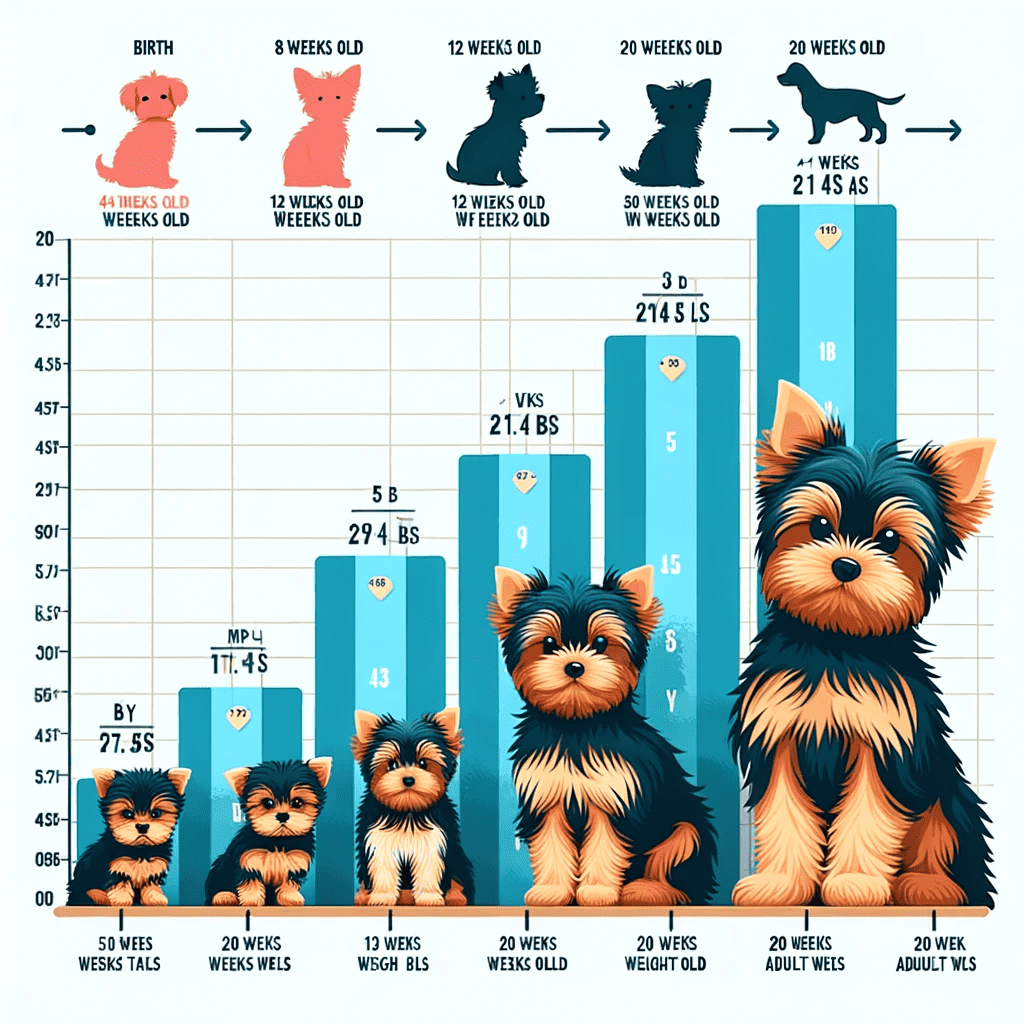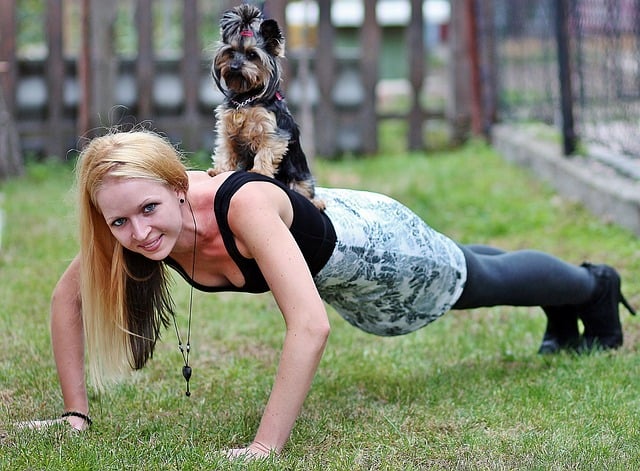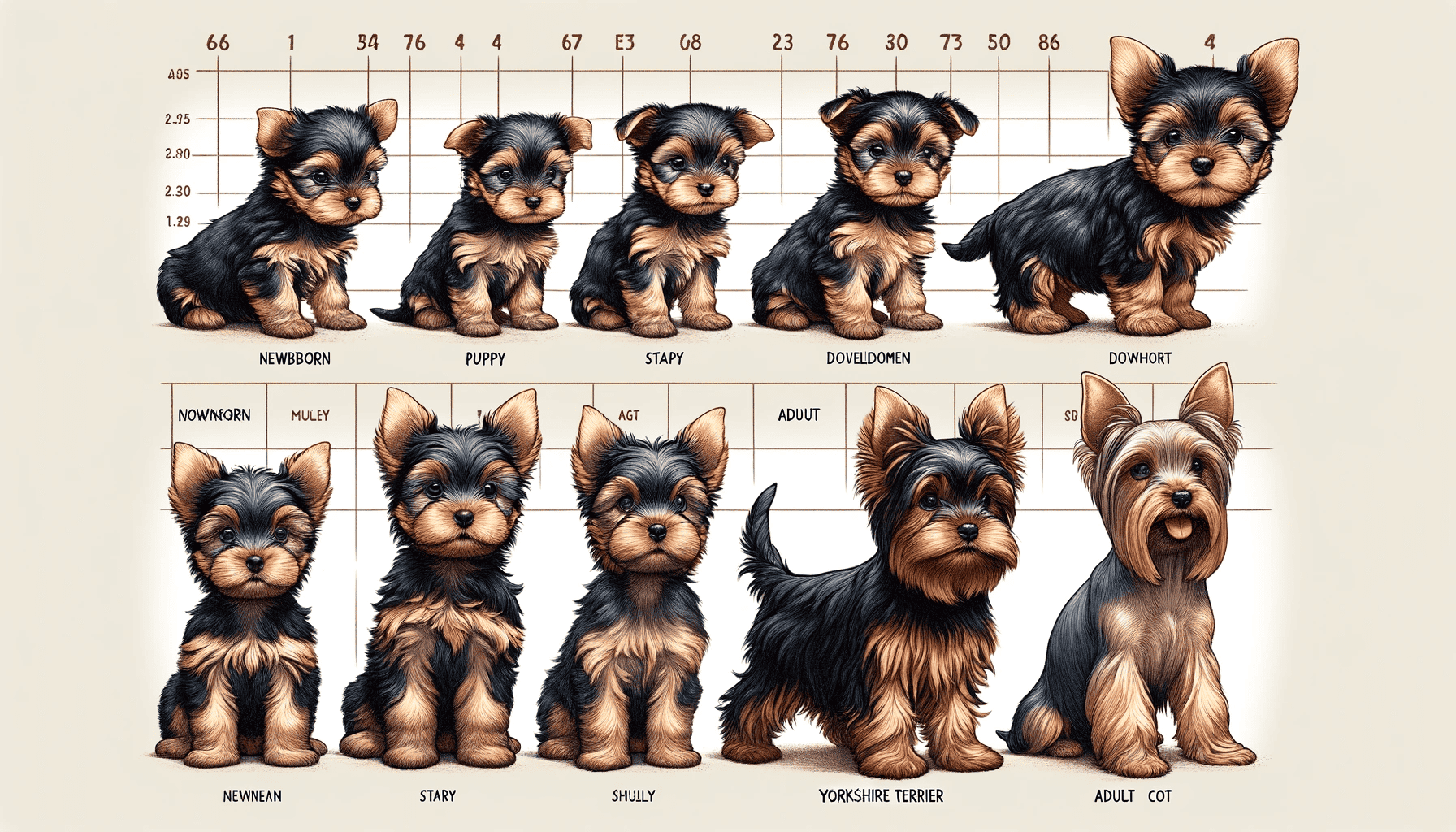So you’ve just brought home an adorable new Yorkie puppy. Congratulations! Yorkies are wonderful companions. Now the fun really begins as you get to watch your tiny furball grow into an adult dog. Yorkie growth happens quickly, so you’ll want to understand the key milestones and make sure your pup is developing properly. Monitoring your Yorkie growth chart will also help you provide the best care for your pooch at each stage.
Whether your Yorkie is a newborn, adolescent or fully grown, this guide will walk you through what to expect. You’ll learn the typical size, weight, teeth development, coat changes and other physical milestones for Yorkies at different ages. You’ll also discover how factors like genetics, diet, health and environment can influence your Yorkie’s growth. Fasten your seatbelt – the journey from puppy to adult Yorkie in 12 short months is going to be an exciting ride!

Things To Know About Yorkie Growth Chart Stages
As a new Yorkie owner, understanding their growth and development over the first year is important. Yorkies go through several distinct stages as they mature into adult dogs. Monitoring your Yorkie’s progress and providing proper care at each stage will help ensure they develop into a happy, healthy companion.
Newborn Stage of a Yorkie
The newborn stage spans the first couple weeks of a Yorkie’s life. Yorkie puppies are blind, deaf, and dependent on their mother at birth. Puppies should stay with their mother during this stage. Breeders will handle puppies briefly each day to socialize them to human contact.
Puppy Stage of a Yorkie
Around 3-4 weeks, Yorkie puppies open their eyes and ears, and become more mobile and vocal. This is when breeders will start basic training and housebreaking. Between 4 to 12 weeks, puppies start interacting with their environment and learning critical social skills from their mother and littermates.
Adolescent Stage of a Yorkie
From 4 months to about 1 year, Yorkies go through adolescence. House training, basic obedience training, and socialization should continue during this time. Adolescent Yorkies require patience, as they can be rambunctious and test boundaries. Providing exercise, play, and mental stimulation will help channel their energy into positive behaviors.
Adult Stage of a Yorkie
By 1 year, Yorkies reach adulthood. They have likely reached their full size, and require annual checkups, grooming, good nutrition, exercise, and ongoing training/socialization. Adult Yorkies can live up to 15-20 years, so this stage makes up the majority of a Yorkie’s life. With proper care and attention, Yorkies can be well-adjusted, lifelong companions.
The Yorkie’s development over their first year lays the foundation for a long, happy life as your faithful friend. Closely monitoring their progress, meeting needs, and training them well in puppyhood will reward you with an amazing adult companion for years to come.
Understanding the Different Yorkie Growth Stages
Understanding the different growth stages of a Yorkie will help you know what to expect as your puppy matures into an adult. Yorkies go through four main stages: newborn, puppy, adolescent and adult.
Yorkie Growth Chart Month-by-Month
Month-by-Month Growth Chart of Your Yorkie
Your Yorkie puppy will grow and develop quickly during their first year. Understanding the stages of growth and being prepared for changes will help you provide the best care for your Yorkie.
Yorkie Growth Chart: 1-3 Months
Yorkie puppies at this age are tiny, often weighing just 1 to 3 pounds. They need to eat several small meals a day of puppy food to support their growth. Take your Yorkie to the vet for their initial vaccinations and deworming. House training and basic obedience training should start right away. Expect lots of sleep, play, and bonding with their new family during these early months.
Size and Weight
Yorkie puppies typically weigh between 1 to 3 pounds at 8 weeks of age when you first bring them home. They will gain about 1/2 pound per week over the next few months. Most Yorkies will weigh between 3 to 7 pounds by 12 weeks of age. Every puppy is different, so don’t worry too much if your Yorkie is a bit smaller or larger. As long as they are active, eating well, and keeping up with milestones, they should be perfectly healthy.
Teething and Chewing in Yorkies
Around 3 to 4 weeks of age, your Yorkie’s baby teeth will start to come in. Teething can cause discomfort, so provide chew toys that can be frozen or chilled. This helps soothe their gums. Yorkie puppies also love to chew during teething, so keep shoes, wires, and anything else they could choke on out of reach. Offer appropriate chew toys instead to redirect them.
Learning and Socialization of Your Yorkie
The first 3 months are a critical socialization period for Yorkie puppies. Expose your puppy to new people, sights and sounds in a positive, controlled way. Carry your puppy facing forward in your arms, praising and treating them when they remain calm. Invite friends over to gently pet and play with your puppy. Early positive socialization helps prevent behavior problems later on.
Housetraining and Crate Training
Yorkie puppies have small bladders and need to go out frequently, about once every 1-2 hours. Closely supervise your puppy indoors, and take them out right after they eat, drink or wake up. Crate train your Yorkie to aid in house training. The crate should only be big enough for them to stand up and turn around. Never leave a Yorkie puppy in a crate for more than a few hours. Housetraining a Yorkie can take 4-6 months of consistency and patience.
With proper care and nutrition, Yorkie puppies will thrive during these early months. Be sure to take your puppy for regular vet checkups and vaccinations to monitor their growth and development. The rewards of raising a well-adjusted, loving Yorkie companion will make the challenges of puppyhood well worth it!

Yorkie Growth Chart: 4-6 Months
At 4 months, a Yorkie typically weighs between 2 to 3 pounds. They’ll reach about half their adult size by 6 months, weighing 3 to 4 pounds for males and 3 to 5 pounds for females. Yorkies grow rapidly during this stage, so they’ll need high-quality puppy food to support their development. Feed them 3 small meals a day and always have fresh, clean water available.
Your Yorkie’s baby teeth will start falling out around 4 months as their adult teeth come in. Chew toys can help relieve teething pain and also discourage chewing on inappropriate objects. Brush their teeth regularly with a puppy toothpaste and toothbrush to get them accustomed to dental care from an early age.
Around 5 months, a Yorkie’s coat will start to change from soft and fluffy to silky and flowing. Daily brushing and combing is a must to prevent tangles and mats. Bathing once a month or every other month is typically sufficient. Be very gentle and use a mild puppy shampoo and conditioner.
At this stage, Yorkies can learn basic commands like ‘sit,’ ‘stay’ and ‘come.’ Use positive reinforcement training with treats, praise and play. Keep training sessions short and fun. Socialization is also important, so introduce your Yorkie to new people, pets and experiences in a gradual, positive way.
With the right nutrition, training, socialization, and veterinary care, your Yorkie will grow into a happy, healthy companion. Be patient through challenges and enjoy every moment with your adorable little fur ball!
Yorkie Growth Chart: 7-9 Months
Yorkies are almost adults at this point, weighing 7 to 10 pounds. Reduce feedings to twice a day. Yorkies go through an adolescent phase and may test boundaries, so remain patient and consistent with training. Neutering or spaying your Yorkie around 6-8 months can help calm hormonal behavior changes.
Yorkie Growth Chart: 10-12 Months
Your Yorkie reaches full maturity at 12 months. Most Yorkies will weigh between 8 to 15 pounds as adults, depending on genetics. Transition to feeding your Yorkie twice a day with a high-quality adult dog food to maintain their ideal body weight. Yorkies are prone to dental issues, so start brushing your Yorkie’s teeth regularly and schedule routine vet checkups. By providing mental and physical stimulation, your Yorkie will remain an energetic and lively companion for many years.
Size and Weight of Your Yorkie
Your Yorkie will likely reach their full adult height of 8-9 inches at the shoulder during this period, though they may continue gaining weight until 12-18 months. At 10 months, a male Yorkie weighs 4-6 pounds, while a female weighs 3-5 pounds. By their first birthday, males are 5-7 pounds and females are 4-6 pounds. Yorkies are considered adults at 12 months, though some continue maturing until 18 months.

Physical Changes
Your Yorkie’s baby teeth will fall out and be replaced by their permanent adult teeth during this stage. Their silky, fine coat will continue to grow in and require frequent brushing and combing to prevent matting and tangles. Yorkies remain a very active and energetic breed at this age, so continue providing plenty of exercise, play, and mental stimulation for your pup.
Training and Socialization of Your Yorkie
Continue reinforcing basic training and commands with your Yorkie, and start introducing more advanced training. Work on leash training, crate training, and house training. Extensive socialization at this age is critical for developing a friendly, outgoing temperament. Invite friends over, take your Yorkie on walks, arrange play dates with other dogs, and expose them to new situations and environments.
Diet of Your Yorkie
Your Yorkie should continue eating a high-quality puppy food formulated for small breed dogs until 12 months of age. At 10-12 months, most Yorkies do well eating two slightly larger meals a day. Measure out portions carefully and avoid leaving food out all the time to prevent obesity. Yorkies have a tendency to become overweight, which can lead to health issues.
Providing the right nutrition, training, socialization, and veterinary care during these months will set the stage for a long, healthy, and happy life with your Yorkie. While they may act like little adults at this point, they still have some maturing to do over the next several months. With patience and consistency, you’ll make it through the trials of puppyhood and be rewarded with a well-adjusted, lifelong companion.
Factors Influencing Yorkie Growth Chart Rate
Several key factors determine how quickly (or slowly) your Yorkie puppy will grow. Paying close attention to these influences and making adjustments as needed can help ensure your Yorkie reaches their full size and development potential.
The genes your Yorkie inherited from their parents are the biggest influence on their growth. Yorkies from larger parents will typically grow bigger than Yorkies from smaller parents. There’s no way to know exactly how big your Yorkie will get until they finish growing between 12 to 24 months.
Providing your Yorkie a healthy, high-quality diet tailored to their life stage is essential for proper growth. As a puppy, your Yorkie needs more calories, protein, and certain nutrients to support their rapid growth. Feed your Yorkie puppy food specifically for small breed puppies. For adults, choose a high-quality small breed adult dog food. Measure out portions carefully and avoid overfeeding.

Vet Visits Are Important
Take your Yorkie for regular veterinary checkups and care. A vet can monitor your Yorkie’s growth, ensure they stay on track, and check for any health issues. Parasites, infections or other medical problems can slow down growth if left untreated. Your vet will also provide essential vaccinations and deworming to keep your Yorkie healthy as they grow.
Giving your Yorkie plenty of opportunities for exercise, play and interaction will also support their growth and development. Yorkie puppies especially need mental and physical stimulation to develop properly. Provide your Yorkie with interactive dog toys to play with, take them on short walks, and spend lots of time playing, cuddling and training your puppy every day.
Keeping a close eye on your Yorkie growth chart and making adjustments to their environment and care as needed will help ensure your playful pup reaches their full potential and lives a long, healthy life as your faithful companion.


